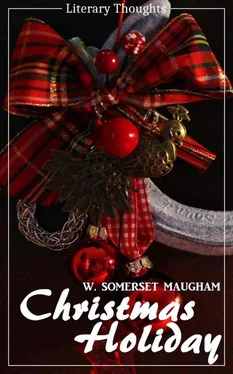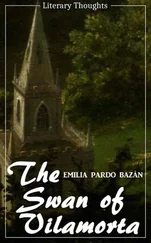“It makes one think a bit,” said Leslie to his wife, a smile of pride shining in his kindly eyes, “to see two young things like that taking to Matisse like a duck takes to water.”
She gave him a look that was partly amused and partly rueful.
“They think I’m dreadfully old-fashioned because I still like Monet. They say it’s pure chocolate-box.”
“Well, we trained their taste. We mustn’t grouse if they go ahead and leave us behind.”
Venetia Mason gave a sweet and affectionate laugh.
“Bless their hearts, I don’t grudge it them if they think me hopelessly out of date. I shall go on liking Monet and Manet and Degas whatever they say.”
But it was not only to the artistic education of their offspring that the Leslie Masons had given thought. They were anxious that there should be nothing namby-pamby about them and they saw to it that they should acquire proficiency in games. They both rode well and Charley was not half a bad shot. Patsy, who was just eighteen, was studying at the Royal Academy of Music. She was to come out in May and they were giving a ball for her at Claridge’s. Lady Terry-Mason was to present her at Court. Patsy was so pretty, with her blue eyes and fair hair, with her slim figure, her attractive smile and her gaiety, she would be snapped up all too soon. Leslie wanted her to marry a rising young barrister with political ambitions. For such a one, with the money she’d eventually inherit from the Mason Estate, with her culture, she’d make an admirable wife. But that would be the end of the united, cosy and happy family life which was so enjoyable. There would be no more of those pleasant, domestic evenings when they dined, the four of them, in the well-appointed dining-room with its Steer over the Chippendale sideboard, the table shining with Waterford glass and Georgian silver, waited on by well-trained maids in neat uniforms; simple English food perfectly cooked; and after dinner, with its lively talk about art, literature and the drama, a glass of port, and then a little music in the drawing-room and a game of bridge. Venetia was afraid it was very selfish of her, but she couldn’t help feeling glad that it would be some years at least before Charley could afford to marry too.
Charley was born during the war, he was twenty-three now, and when Leslie had been demobbed and gone down to Godalming to stay with the head of the family, already a Member of Parliament, but then only a knight, Sir Wilfred had suggested that he should be put down for Eton. Leslie would not hear of it. It was not the financial sacrifice he minded, but he had too much good sense to send his boy to a school where he would get extravagant tastes and acquire ideas unfitted to the station in life he would ultimately occupy.
“I went to Rugby myself and I don’t believe I can do better than send him there too.”
“I think you’re making a mistake, Leslie. I’ve sent my boys to Eton. Thank God, I’m not a snob, but I’m not a fool either, and there’s no denying it, it’s a social asset.”
“I dare say it is, but my position is very different from yours. You’re a very rich man, Wilfred, and if things go well you ought to end up in the House of Lords. I think it’s quite right that you should give your sons the sort of start that’ll enable them to take their proper place in society, but though officially I’m secretary of the Mason Estate and that sounds very respectable, when you come down to brass tacks I’m only a house agent, and I don’t want to bring up my son to be a grand gentleman, I want him to be a house agent after me.”
When Leslie spoke thus he was using an innocent diplomacy. By the terms of old Sibert’s will and the accidents that have been already narrated, Sir Wilfred now possessed three-eighths of the Mason Estate, and it brought him in an income which was already large, and which, with leases falling in, the increasing value of the property, and good management, would certainly grow much larger. He was a clever, energetic man, and his position and his wealth gave him an influence with the rest of the family which none of its members questioned, but which it did not displease him to have acknowledged.
“You don’t mean to say you’d be satisfied to let your boy take on your job?”
“It was good enough for me. Why shouldn’t it be good enough for him? One doesn’t know what the world’s coming to and it may be that when he’s grown up he’ll be damned glad to step into a cushy billet at a thousand a year. But of course you’re the boss.”
Sir Wilfred made a gesture that seemed modestly to deprecate this description of himself.
“I’m a shareholder like the rest of you, but as far as I’m concerned, if you want it, he shall have it. Of course it’s a long time ahead and I may be dead by then.”
“We’re a long-lived family and you’ll live as long as old Sibert. Anyhow, there’ll be no harm in letting the rest of them know that it’s an understood thing that my boy should have my job when I’m through with it.”
In order to enlarge their children’s minds the Leslie Masons spent the holidays abroad, in winter at places where they ski and in summer at seaside resorts in the South of France; and once or twice with the same praiseworthy intention they made excursions to Italy and Holland. When Charley left school his father decided that before going to Cambridge he should spend six months at Tours to learn French. But the result of his sojourn in that agreeable town was unexpected and might very well have been disastrous, for when he came back he announced that he did not want to go to Cambridge, but to Paris, and that he wished to be a painter. His parents were dumbfounded. They loved art, they often said it was the most important thing in their lives, indeed Leslie, not averse at times from philosophical reflection, was inclined to think that it was art only that redeemed human existence from meaninglessness, and he had the greatest respect for the persons who produced it; but he had never envisaged the possibility that any member of his family, let alone his own son, should adopt a career that was uncertain, to some extent irregular, and in most cases far from lucrative. Nor could Venetia forget the fate that had befallen her father. It would be unjust to say that the Leslie Masons were put out because their son had taken their preoccupation with art more seriously than they intended; their preoccupation couldn’t have been more serious, but it was from the patron’s point of view; though no two people could have been more bohemian, they did have the Mason Estate behind them, and that, as anyone could see, must make a difference. Their reaction to Charley’s declaration was quite definite, but they were aware that it would be difficult to put it in a way that wouldn’t make their attitude look a trifle insincere.
“I can’t think what put the idea into his head,” said Leslie, talking it over with his wife.
“Heredity, I suppose. After all, my father was an artist.”
“A painter, darling. He was a great gentleman and a wonderful raconteur, but no one in his senses could call him an artist.”
Venetia flushed and Leslie saw that he had hurt her feelings. He hastened to make up for it.
“If he’s inherited a feeling for art it’s much more likely to be from my grandmother. I know old Sibert used to say you didn’t know what tripe and onions were until you tasted hers. When she gave up being a cook to become a wife of a market gardener a great artist was lost to the world.”
Venetia chuckled and forgave him.
They knew one another too well to have need to discuss their quandary. Their children loved them and looked up to them; they were agreed that it would be a thousand pities by a false step to shake Charley’s belief in his parents’ wisdom and integrity. The young are intolerant and when you talk commonsense to them are only too apt to think you an old humbug.
Читать дальше












